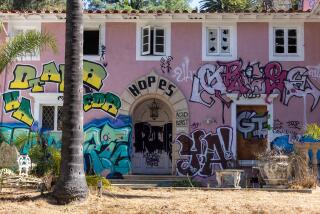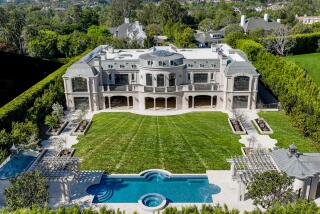The sensational society killings that rocked L.A. — still a mystery 90 years later
In the annals of sensational Los Angeles slayings, few compare to the crime that occurred 90 years ago today in a grand mansion at the top of a hill.
Exactly what happened would be debated for decades, clouded by wealth, power and many cover-ups.
Here’s a summary from the pages of The Times:
Edward Laurence “Ned” Doheny Jr., the 35-year-old heir to an oil family fortune, was found dead, shot through the head, at Greystone Mansion, his 55-room, Tudor-style home in Beverly Hills.
His secretary, Hugh Plunkett, was found nearby, also dead of a bullet wound.
After a brief investigation, authorities ruled that a deranged Plunkett had shot his employer and then turned the gun on himself. But to this day the crime is a source of rumor and speculation. Was it really a murder-suicide or just made to look that way? Was it tied to another scandal?
Doheny was the son of L.A.’s richest man, and that’s what led to so many questions that were never answered. Some speculated the killing may have been tied to a huge national corruption scandal, which brought more intrigue.
In 2002, historian Richard Rayner explained the context:
Oil, discovered in 1892 near the La Brea Tar Pits by Edward L. Doheny, drove the great L.A. boom. By the early 1920s, Doheny was one of the richest men in America. In 1922, he sent his son Ned and Ned’s chauffeur, Hugh Plunkett, to Washington, where they handed $100,000 in a black leather satchel to Interior Secretary Albert Fall. In exchange Doheny got the lease on a naval oil reserve, worth some $100 million. It all came out as part of the Teapot Dome scandal that brought down Warren Harding’s administration.
In 1929 the unstable Plunkett was due to testify before one of the ongoing investigations, but on the night of Feb. 16, he and Ned Doheny were found dead on the floor of a bedroom in one of the Doheny mansions. Both had been shot in the head. Buron Fitts, recently elected district attorney, promised a full investigation. None came. To look over back issues of the L.A. papers during that period is to receive a blunt lesson. The case explodes, receives a brief blizzard of press, and then ... nothing. The doors shut, the waters close over, the official line is peddled: Plunkett went mad, shot Doheny and then himself. It’s a stunning example of power at work.
Indeed, coverage of the case dropped off decidedly. That, many historians say, was the power of the Doheny family back then.
But the deaths, after years of financial scandals, took its toll on the elder Doheny, who faded from public view.
The case was closed, but speculation continued about what really happened.
The Los Angeles Public Library broke down the many theories of what really happened. KCET TV profiled the scene of the crime.
Times Staff Writer Shelby Grad contributed to this report.
More to Read
Sign up for Essential California
The most important California stories and recommendations in your inbox every morning.
You may occasionally receive promotional content from the Los Angeles Times.










